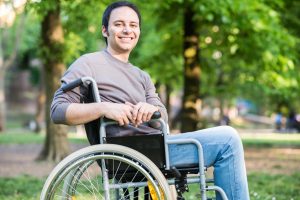Whether you were the person who has been injured or the injury happened to someone close to you, it’s completely normal to feel a range of different emotions after a serious injury on the road.

Shock, guilt, anger, depression, sadness and insecurity are all common things that people feel following such a traumatic experience.![]()
These feelings normally fade over-time, but it is important that you access help and support to help this process.
Voice is here to help you with whatever you’re feeling. Our specially trained team will help you to understand your emotions and to explore your feelings to help you to cope and recover from any incident.
I can’t believe it has happened
Many people feel shock after an accident and find it hard to even register that the incident happened.
Shock can be particularly hard to bear if the crash has resulted in life-changing injuries for you or a loved one or if someone died in the crash. It may all seem unfair; ‘why has this happened?’ is a common thought.
It is normal to go over the circumstances leading up to the incident and wonder if you, or others, could have done anything to stop it happening. ‘If only…’ is a usual and particularly painful thought process.
It is important at this time to get help and support from Voice and those around you.
Many people find it difficult to share their feelings with others. However, sharing feelings does help, particularly with close family and friends who may be experiencing similar feelings.
Sometimes, family and friends find it challenging to share thoughts with each other because they are trying to be strong for each other, or for other reasons to do with their relationships with each other. However, mutual support can be very helpful, and stop you feeling a sense of isolation.
If you can’t share your thoughts with someone close to you, or you find that this doesn’t help, speak to Voice. Our trained counsellors are on hand and ready to talk to you when you feel like it at a location that suits you.
I have very strong emotions
At times the things you feel may be over-powering and exhausting. In addition to shock, common feelings you may experience include:
- anger;
- anxiousness;
- stress;
- worry;
- depression; and
- feeling scared.
Some days may feel much worse than others – people often feel like they are on a rollercoaster of emotions.
What you can do
Understand these feelings are normal
It is not your fault that you are feeling this way, and it is normal in the circumstances. These feelings are not part of your character, and if you take care of yourself and seek support, they can subside over time and be replaced by more positive feelings. Treat yourself to simple comforts that are likely to make you feel a tiny bit better or calmer. This could be as simple as a cup of tea or listening to calm music.
Keep talking
It can help to explain to other people how you are feeling so they are not surprised if you display these feelings around them. At work, it can help to talk to your employer and colleagues. If you are at school, it can help to explain things to your teacher and friends.
Some people find that being creative helps them to be calm. For example, writing, drawing or mounting photographs can be positive, peaceful activities.
Take your time
There are no quick fixes to everything you are feeling – it is part of a natural process caused as a result of the road traffic collision. It is important therefore not to try to rush the process and put yourself under pressure. Go easy on yourself and remember to look out for signs of how well you’re doing.
Likewise, it is important not to rush tasks that you think should be easy or straight forward. In times of severe stress, your body and brain are dealing with a lot of different things and it is normal for usually straight-forward tasks to feel more challenging.
I’m having flashbacks/nightmares
Vivid thoughts and dreams about the incident, the person who has died, or a fear, are a frequent response to bereavement and usually become less intense as time goes by.
Talking about what happened can help – Voice is here to help you explore your thoughts and feelings following a road incident.
Flashbacks can be extremely realistic and make you feel like you are experiencing everything again. Not everyone suffers flashbacks, but if you do, they may happen at any time and be frightening.
Things that you can do if you are experiencing flashbacks are:
- tell yourself you are having a flashback and the experience you are seeing is from the past;
- remind yourself that the worst is over and the feelings you are experiencing are memories of the past;
- breathe. The flashback will most probably cause you to feel frightened which changes normal breathing. Your body may then start to panic due to lack of oxygen. Breathing deeply can help the feeling of panic to subside;
- re-establish to the present. Use your five senses. Look around and see the colours in the room, the shapes of things, the people near, and so on. Listen to the sounds in the room; your breathing, traffic, birds, people, cars etc. Feel your body and what is touching it; your clothes, your own arms and hands, the chair or floor supporting you;
- find your boundaries. Sometimes when having a flashback things get out of proportion and you may lose the sense of yourself. Do anything that you can to make yourself feel safe such as wrapping yourself in a blanket, hold a pillow or soft toy or go to bed; and
- get help. You may feel the need to be alone or you may want someone near you. In either case it is important that your friends and relations know about flashbacks so they can help with the process, whether that means letting you be by yourself or being there, whatever is right for you is right. Our specialist counsellors can also help.
